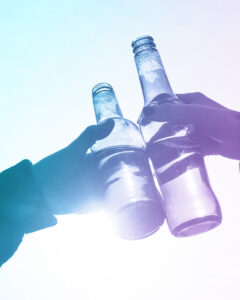Alcohol and Psychosis
Alcohol has been your solace for years, ever since your dad left and your mom got sick. Despite being on your own from an early age, you managed decent enough for yourself, even with your drinking habits. You held your job, kept a tidy apartment, and even bought yourself a car. Drinking just never got in the way of anything.

But as the years went on, you would find that you were beginning to not feel like yourself. When you would drink after work, you could hear a voice speaking but no one was there. The TV was off and you weren’t looking at your phone. Sometimes, there would be multiple voices, telling you things that couldn’t be true – things like your coworkers don’t like you, they all know you drink too much and you’re not actually good at your job.
You continued drinking, trying to silence your mind. When one of your coworkers drops by, he can see something is not right. You know this coworker, he is a good friend, but the voices are against him, telling you he is lying to you about everything. You can’t stop – you begin yelling at him and threatening him. Terrified, he leaves you to your thoughts that you can no longer seem to control.
In 2021, the rate per 100,000 of alcohol-confirmed motor vehicle accidents was around 27, higher than the state average of 23.2. Clean Recovery Centers understands how alcohol can quickly turn situations dangerous when the person decides to try to drive, but even more so when the person is not thinking clearly. The mind is valuable, and alcohol can take away its ability to function properly. Our program addresses both mental and physical health in our unique, three-phase approach to treatment. So, what is alcohol psychosis, and are you at risk?
Alcohol-Induced Psychosis: What is It?
Psychosis is commonly associated with hallucinations. This can include hearing or seeing things that are not there, believing situations to be true that are false, and confused thoughts. Alcohol-induced psychosis can occur while intoxicated, during withdrawal, or from chronic alcohol use disorder. Paranoia, fear, and hallucinations characterize alcohol-induced psychosis, and can be comparable to schizophrenia. However, alcohol-induced psychosis is its own condition separate from other mental health disorders.
The cause of alcohol-induced psychosis is unclear. Some have speculated that dopamine and serotonin levels play a role in triggering a psychotic episode. Neuro-imaging has shown abnormalities involving how fluids are transferred throughout the brain. These abnormalities were noticed throughout various areas of the brain and were prominent in those who have an alcohol use disorder.
Symptoms of Alcohol Psychosis
Symptoms of alcohol-induced psychosis can vary per person, but some common ones include:
- Auditory or visual hallucinations
- Delusions
- Agitation
- Confused and inaudible speech
- Fear
Falls and injuries can occur during episodes of psychosis while intoxicated. It is important to try to keep the person calm and get them to a safe space. If you cannot get them to somewhere safe, call for help.
Psychosis from alcohol use is typically less severe than someone experiencing a schizophrenic episode. However, doctors will still have to evaluate the symptoms you are experiencing and rule out any other mental health condition.
Is Alcoholic Psychosis Acute?
 Alcoholic psychosis episodes are typically not permanent and are considered acute. Once the person is stabilized, psychosis will eventually go away. If drinking continues, the likelihood of another occurrence of alcohol-induced psychosis increases. Those who have a mental health condition are also more likely to experience alcohol-induced psychosis, such as those with bipolar I disorder. A healthcare provider will work with you to find the root causes of psychosis and if they are alcohol-related.
Alcoholic psychosis episodes are typically not permanent and are considered acute. Once the person is stabilized, psychosis will eventually go away. If drinking continues, the likelihood of another occurrence of alcohol-induced psychosis increases. Those who have a mental health condition are also more likely to experience alcohol-induced psychosis, such as those with bipolar I disorder. A healthcare provider will work with you to find the root causes of psychosis and if they are alcohol-related.
Alcoholic Hallucinosis
Alcoholic hallucinosis is a rare but serious complication of chronic, heavy alcohol use. It is defined as predominantly auditory hallucinations occurring either during or after drinking heavily. The condition has been known for years, but the classification status is still unclear. It was noted that alcoholic hallucinosis is not the same as delirium tremens and was often referred to as alcohol-induced psychotic disorder. Delusions and mood swings accompany alcoholic hallucinosis, even though the person is in a clear state of consciousness.
Dangers of Alcohol-Induced Psychosis
Alcohol-induced psychosis can pose a threat to your overall health and well-being. Hearing voices that are not there can affect your overall perception and make you do things you wouldn’t normally do. You may have thoughts about harming yourself or others and not be able to make rational decisions. This puts you and those around you at risk for injuries.
The condition can occur for months even after the person has stopped drinking. It is important to stay active with treatment and manage the condition to avoid any dangerous situations. 10 to 20 percent of those who experience alcohol-induced psychosis develop a chronic form of the condition, similar to schizophrenia.
How to Help Yourself or a Loved One Experiencing Alcoholic Psychosis
Experiencing psychosis can be scary for you and your loved ones. The earlier the condition is addressed, the better the prognosis of healing. Stopping alcohol use will help reduce the number of episodes experienced. Treatments to manage the condition can also help keep symptoms at bay while the brain and body heal. If you or your loved one do not feel alcohol use can stop, seek a medical detox center and treatment program. They will offer all the resources and treatment needed to help you recover from an alcohol use disorder.
Does Alcohol Withdrawal Cause Psychosis?
Alcohol withdrawal comes with a slew of symptoms, and psychosis can occur even after drinking has stopped. The body is already stressed when experiencing withdrawal as it tries to regulate the system without alcohol. This can put added weight on the mind and induce episodes of psychosis. Symptoms are still the same as if the person experienced an episode while intoxicated, and the risk of harming yourself or others is still very strong. If you are trying to go through withdrawal on your own and experience psychosis, seek medical attention.
Delirium Tremens
Delirium tremens (DTs) are the most serious form of alcohol withdrawal. They are characterized by confusion, seizures, shakiness, high blood pressure, hallucinations, and fever. DTs usually begin 2-5 days after the last drink and can be fatal if not treated properly. However, they are different from alcohol-induced psychosis. Alcohol-induced psychosis usually begins during intoxication and can be a part of the withdrawal process, but is not accompanied by seizures or fever. Both DTs and alcohol-induced psychosis can last for weeks or months after the last drink.
Alcoholism Treatment in Hillsborough County, FL
Experiencing psychosis is extremely frightening and can result in scary situations. Recognizing that alcohol is causing it is the first step in the direction of healing. Finding an alcohol rehab that specializes in treating both the physical and mental symptoms that accompany alcohol use disorder is crucial to your success in recovery. Coping skill development, group and individual therapy, and wellness education will pave the way to your new life free from alcohol. You will be surrounded by support from peers and professionals alike to provide guidance on the next chapter of your life.
If you or someone you love is managing an alcohol use disorder, look no further than Clean Recovery Centers. We have multiple locations throughout the Suncoast that provide ease of access to treatment, and a comprehensive program that addresses all aspects of addiction: physical, mental, social, and spiritual. Call us today at (888) 330-2532 to begin the journey to get clean, live clean, and stay clean.
FAQs About Alcohol-Induced Psychosis
How long does psychosis last?
Psychosis from alcohol use can last for months even after drinking has stopped. Those who continue to drink heavily may develop a permanent condition involving psychosis.
How can alcohol trigger a psychotic episode?
The exact cause of alcohol triggering a psychotic episode is unclear. Many believe it involves chemical interactions between serotonin and dopamine. Brain scans have shown abnormalities in many areas involving fluid transferring in those who have an alcohol use disorder.


